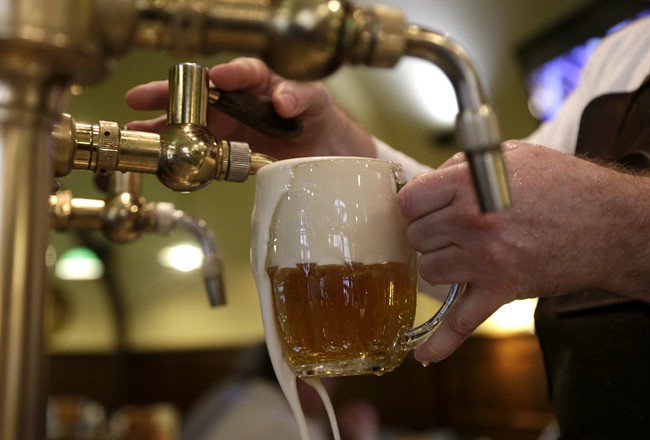Nova Scotia’s police chiefs are shining a spotlight on drink tampering, after several high-profile cases of suspected druggings in downtown Halifax.

At a meeting this fall, members of the Nova Scotia Chiefs of Police Association agreed to make the issue a priority, focusing on community education and prevention.
They are also calling on people who believe they have been victimized to report it.
READ MORE: N.S. police to review drink-tampering response as another woman comes forward
“If you think it has happened, then you need to go to the police,” said Halifax RCMP Chief Supt. Lee Bergerman, chairwoman of the association’s drug committee, who has sent a letter to community organizations across the province about drink tampering.
Although she said an analysis of police data did not reveal a widespread problem with spiked drinks, she said that shouldn’t be interpreted as “minimizing the seriousness of this issue.”
“We felt we could play a role in highlighting the need for increased reporting of such incidents as well as enhanced overall awareness of this issue,” Bergerman said in the Nov. 1 letter sent to 10 community groups.
She said police would like the organizations to help raise awareness about drink tampering and encourage possible victims to come forward.
Bergerman said increased awareness and education “can be part of the solution in reducing additional victimization.”
The move comes after multiple women said they had been slipped unidentified substances at Halifax bars.

Get breaking National news
Despite the apparent rash of incidents reported in the media, a Canadian Press request under the Freedom of Information Act revealed that police don’t track drink tampering and were unable to provide statistics on reported incidents.
WATCH: Halifax women speak out after alleged drugging at bar

Bergerman said police can’t establish a new database category when stats do not warrant it.
“We do not have the ability or quantitative rationale at this time to add a new data category for this issue,” she said in the letter.
In an interview, Bergerman added that crime analysts comb through reports looking for possible trends, and if there were a spike in reports of drink tamperings it would be noticed – and possibly merit a new data field.
She said part of the problem may be that people are sharing their experience on social media but not reporting suspected drink tampering incidents to police.
“If it’s happening, it’s not being reported to us,” she said.
“Reporting is being done via Facebook, but nobody’s calling the police. We don’t do anything based on gossip, rumour or innuendo.”
Two women came forward this spring after they were allegedly slipped an unidentified substance at a packed Halifax cabaret, prompting several women to speak out about similar experiences: Blacking out after only a few drinks, sleeping long stretches and recalling nothing from the night before.
Some women described being carried home by friends. Others awoke to unfamiliar surroundings with no memory of how they got there or what occurred.
Although some of the victims said they went to a hospital, they said tests did not reveal the presence of drugs and they didn’t bother going to police.
READ MORE: Halifax police criticized for not tracking drink-tampering cases
The QEII Health Sciences Centre doesn’t keep statistics on incidents involving possible date rape drugs, sometimes called roofies, which include rohypnol, ketamine and gamma hydroxybutyric acid (GHB).
Dr. Sam Campbell, the chief of emergency at the Halifax Infirmary, has said that the drugs are extremely difficult to test for because they are rapidly absorbed and metabolized by the body. Also, he said there are several different drugs that can be used, making it challenging to know what to test for.
Neera Ritcey, communications chairwoman with the Nova Scotia chiefs of police, said despite low reports of drink tampering, it doesn’t mean nothing can be done.
“We didn’t want to just conclude things by saying there are simply not enough complaints – and we certainly don’t want to minimize concerns that have been expressed,” she said.
The awareness initiative will involve community response officers and school liaison officers, who have access to higher-risk populations in high schools and on university campuses, Ritcey said.
She added that in the future they may develop public education tool kits about drink tampering, and stressed that awareness and community engagement is an important part of preventing this sort of criminal activity and increasing reporting.







Comments
Comments closed.
Due to the sensitive and/or legal subject matter of some of the content on globalnews.ca, we reserve the ability to disable comments from time to time.
Please see our Commenting Policy for more.